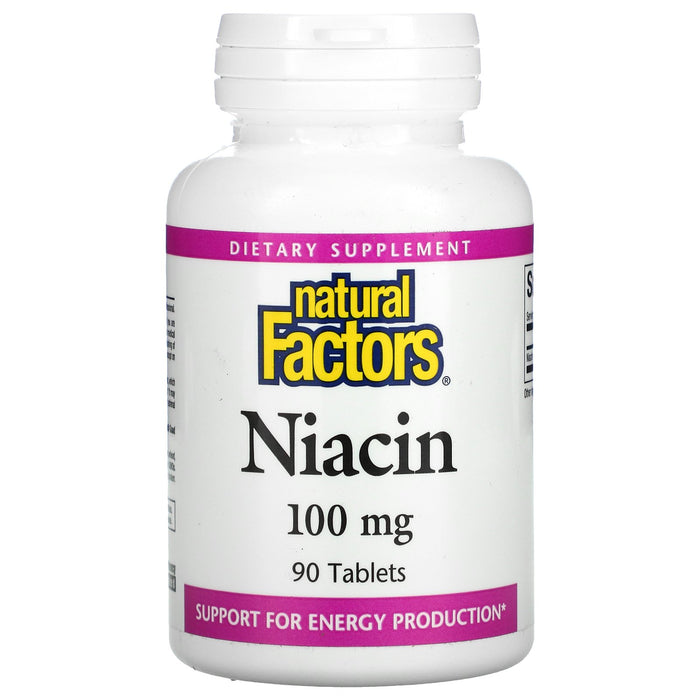




| Serving Size: 1 Tablet | ||
| Servings Per Container: 90 | ||
| Amount Per Serving | % Daily Value | |
| Niacin (vitamin B3) |
100 mg | 625% |
Promote cardiovascular well-being with Natural Factors Niacin, a heart-healthy B vitamin.
Natural Factors Niacin (vitamin B3) is an essential nutrient that supports energy production through the metabolism of carbohydrates, fats, and proteins. This vegetarian-friendly supplement may also help regulate cholesterol levels already within the normal range and support healthy adrenal gland function.
1 tablet 1-5 times per day with food or as directed by a health professional.
Microcrystalline cellulose.
Contains no artificial colors, preservatives, or sweeteners; no dairy, starch, sugar, wheat, gluten, yeast, soy, corn, egg, fish, shellfish, animal products, salt, tree nuts, or GMOs.
Manufactured by Natural Factors to ensure safety and potency in accordance with Good Manufacturing Practices (GMP) of the FDA and Health Canada.
As with any supplement, consult your health professional before use if you are pregnant, breastfeeding, or trying to conceive, or if you are taking medication, have a medical condition, or anticipate a surgery. People sensitive to nicotinic acid may experience flushing of the skin that is generally mild and transient. Do not exceed the recommended dose except on the advice of a health professional. Keep out of the reach of children.
Sealed for your protection. Do not use if seal is broken. For freshness, store in a cool, dry place.
At Health Orchard, we are committed to providing accurate product information and images. However, manufacturers may update their product packaging or ingredients, and these changes may not be immediately reflected on our website. It's possible for products to be shipped with different packaging than what is shown online. For the most accurate and safe use of any product, we advise reading the product's label, warnings, and instructions rather than relying solely on the details provided by Health Orchard.
Niacin has been shown to have beneficial effects on cholesterol levels. It can help increase HDL (good) cholesterol while lowering LDL (bad) cholesterol and triglycerides, potentially contributing to improved cardiovascular health.
Niacin is found naturally in a variety of foods. Rich sources include poultry, beef, fish, nuts, legumes, seeds, whole grains, and fortified cereals. Some vegetables like mushrooms and green peas also contain reasonable amounts of niacin.
Niacin plays crucial roles in various bodily functions. It aids in converting food into energy, supports proper nervous system function, helps maintain healthy skin, and contributes to DNA repair. Additionally, niacin has been shown to have potential benefits for heart health and cholesterol management.
Daily niacin intake is generally safe and necessary for overall health when consumed in appropriate amounts. However, high-dose niacin supplements should be used with caution and under proper guidance, as they can cause side effects like skin flushing and potential liver issues in some individuals.
Individuals with liver disease, stomach ulcers, or a history of gout should be cautious with niacin supplementation. Those with diabetes should monitor their blood sugar closely when taking niacin, as it can affect glucose levels. People taking certain medications, such as statins or blood thinners, should also consult their healthcare provider before using niacin supplements.
Niacin's effects on fatty liver can be complex. While some studies suggest niacin may help reduce liver fat in certain cases, high doses of niacin can potentially cause or exacerbate liver problems in some individuals. It's important to discuss niacin use with a healthcare provider, especially for those with existing liver conditions.